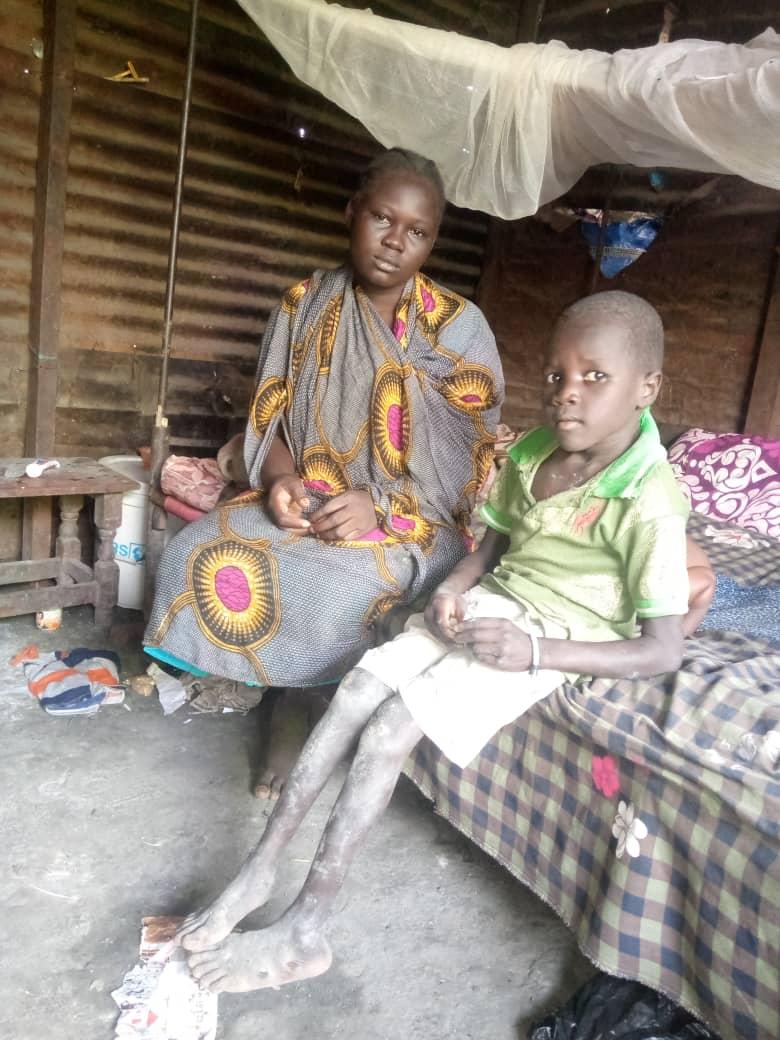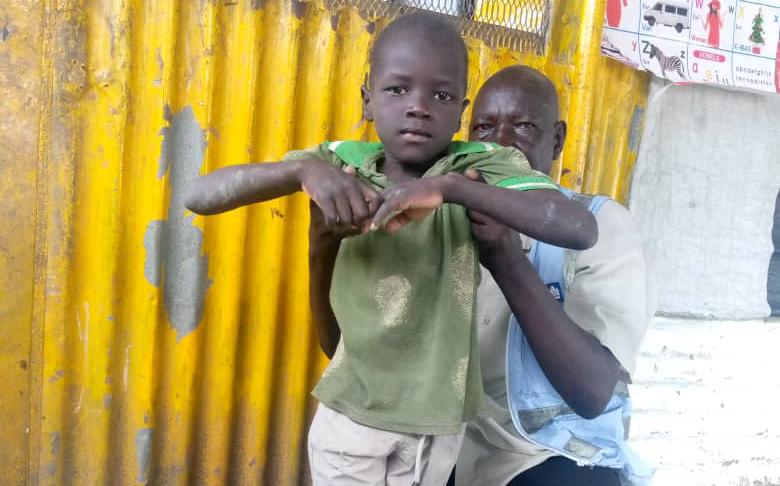Like any other children at the protection civilian site (PoCs) in Malakal, Mutahakit Ojwol finds his way to the Child Friendly Space, CFS run by Widows and Orphans Charitable Organization (WOCO) with support from War Child Holland, to play with other children.
Ojwol is physically impaired after suffering from polio virus at the age of four months. “He was born a normal child but started experiencing pain at his back when he was four months old. He was crying a lot until he was unable to sit, he was only lying on his back”, Gisma Samuel, Ojwol’s mother explains how her first born child suffered a major paralysis at the tender age.
The 8 years old Ojwol struggles to match his ability with his able peers despite his condition. He demonstrates his resolves to live with this condition and accept the reality by visibly looking happy and in control of himself. During his encounter with this author, Ojwol appeared very eager to know whether he will be helped or taken away from his current location.
“What has he come to do here, why is he taking my picture? Will he take me away from here?” In his Cholo language, Ojwol struggled to inquire with great enthusiasm.
“Yes, he will help you. You will go to Juba” a social worker employed by WOCO to run the center persuaded OJwol.

The Story of Mutahakit Ojwol and his widowed mother
Gisma is a widow. Her husband died a natural death few months ago. She is left with three children including Ojwol who is the first born son.
“He died after a long illness, he was not shot with gun, he died from disease that made him sick for some times” Gisma, Ojwol’s mother stressed how her husband passed away.
Gisma and her children now live with her mother. She sells charcoal and firewood to provide for the necessities of the family. “I sell charcoal and firewood to feed my children. My mother goes to the bush to collect the firewood and the charcoal; she leaves them with me to sell. This is how we get our daily needs” Gisma narrates.
The thirty two years old lactating mother lives in a single bed roomed house with her three children and the mother, who does most of the home chores including collecting firewood and charcoal from the bush.
There are hundreds of families with no fathers in Malakal PoCs, in Upper Nile State, where WOCO runs humanitarian operations with funding from Warchild Holland to improve the lives of 10, 000 women and children with special needs, and has established three Child Friendly Spaces to support psychosocial development and wellbeing of Children.
In an area like Malakal, where almost everyone is poor and insecurity which has been exacerbated by inter-communal conflict is widespread, it is obvious that women headed households are more affected than others as it is much harder for them to break out of cycle of poverty. It is definitely more difficult for the women headed family with a disabled member to fend for their daily needs.
Currently Ojwol does not attend formal education as the family can hardly raise money to register him in school.
“He doesn’t go to school; we don’t have money to register him. We can only get money for food and other necessities” Gisma answered when she was asked whether the boy attends school or not”
People with disability in South Sudan face greater risks of being caught in fighting and greater challenges in getting necessary humanitarian assistance, according to the latest Human Rights Watch report.
The report further says an estimated 25, 000 people with disabilities who managed to flee violence have often faced problems getting crucial humanitarian assistance that other people don’t – from using latrines to accessing food distributions and other essential services. People with limited mobility like Ojwol may not be able to reach aid hubs and attend schools far from their displacement camps and cannot always rely on family or friends to carry them there.
WOCO runs three Child Friendly Places; CFS in Malakal PoCs alone. This is where young Ojwol goes to participate in fun activities, such as games, sport, singing, drama and informal learning opportunities in reading, basic hygiene and life lessons, because the center is less than 50 meters from where he lives.
Report by Okuna Joe Albert
Malakal, Upper Nile State, South Sudan
